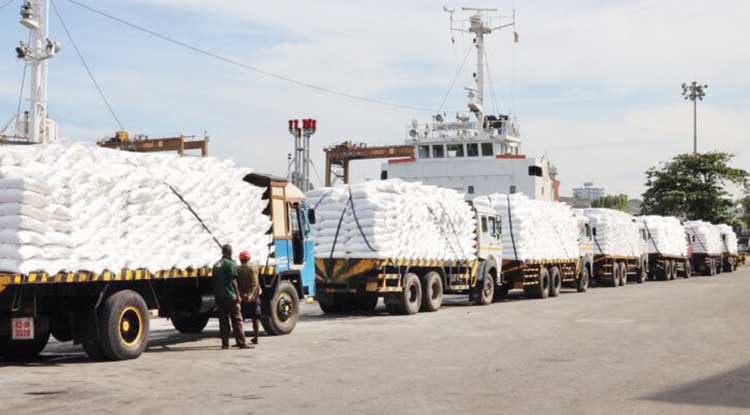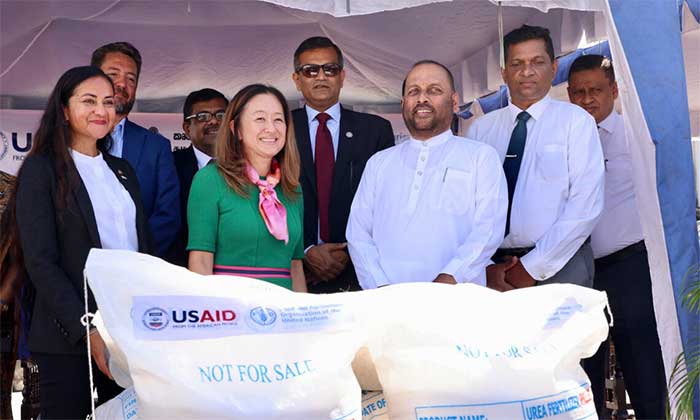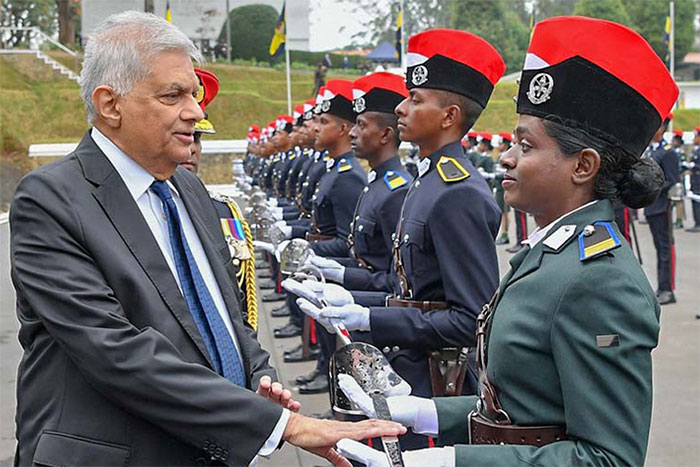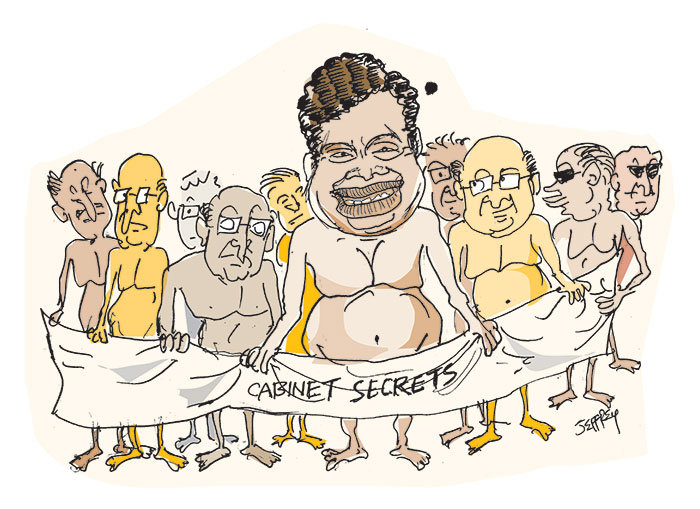SPECIAL REPORT : Part 450
By Shamindra Ferdinando
A steady stream of press releases, issued during 2022, by Colombo-based diplomatic missions, UN and its agencies, and those representing INGOs, depicted a pathetic picture of Sri Lanka. They dealt with financial and material assistance, provided on Sri Lanka’s request, and also in line with international response to the developing crisis here.
Ruling Sri Lanka Podujana Peramuna (SLPP), and other political parties, represented in Parliament, seemed to be blind to the rapidly developing crisis, especially against the backdrop of the country continually being denied the USD 2.9 bn IMF loan facility.
Having secured ‘staff level’ agreement on Sept. 01, various government spokespersons expressed confidence in obtaining the first tranche, by end of 2022. That hasn’t materialized.
It would be pertinent to mention that the agreement, on the urgently needed facility, has been held up, pending necessary approval of the overall plan by Beijing and New Delhi. The Treasury and the Central Bank are obviously uncertain when the much desired agreement can be finalized.
Foreign media releases highlighted Sri Lanka’s growing dependence on international assistance. Let me first discuss a statement, dated Dec. 19, issued by the World Food Programme (WFP). Carol Taylor, Communications Associate, WFP, Colombo, in a two-page statement, dealt with the food crisis, with the focus on Dustin Shiau, Senior Regional Programme Officer of the U.S. Agency for International Development (USAID)’s Bureau for Humanitarian Assistance (BHA).
Having to receive humanitarian assistance, 12 years after the successful conclusion of the war against the Liberation Tigers of Tamil Eelam (LTTE), underscored Sri Lanka’s plight.
Referring to the USAID official’s visit to one-time LTTE bastion, Mullaithivu, Taylor asserted the population there is among the worst affected. During the war, the WFP provided significant assistance to those trapped in LTTE held areas, particularly in the Vanni region.
According to Taylor, the US has provided USD 20 mn, in 2022, and of that USD 13 mn (approximately Rs 4.7 bn) enabled them to assist the needy, recently. Declaring that the WFP project got underway, in June, just ahead of President Gotabaya Rajapaksa’s ouster, the operation intended to provide food and nutrition assistance to 3.4 mn people.
Taylor estimated they had so far reached one mn people, including schoolchildren, benefited by the free meal programme.
The WFP press statement has substantiated assertions made by the international community as regards the developing economic-political-social crisis here. The government and the Opposition continued to play politics with an unprecedented national calamity caused by mismanagement of the economy, waste, corruption and irregularities.
Cash-strapped Sri Lanka received USAID financial assistance, amounting to USD 46 mn, to procure 9,300 tonnes of urea. The first consignment reached Sri Lanka in December.
Those in political authority should be ashamed, particularly because they failed to initiate a programme to purchase paddy. In spite of the intervention of President Wickremesinghe and Prime Minister Dinesh Gunawardena, the Wickremesinghe-Rajapaksa government never released funds, required to buy paddy. Agriculture Minister Mahinda Amaraweera owed an explanation as to whether the incumbent government has ceased the purchase of paddy. If so, there is no point in maintaining the Paddy Marketing Board (PMB) at taxpayers’ expense, while the private sector dominates the market.
The first consignment of urea, received in December, was meant to meet the requirement of 193,000 smallholder paddy farmers, in Jaffna, Mullaithivu, Mannar, Vavuniya, Anuradhapura, Trincomalee, Batticaloa and Moneragala districts. Additional stocks are expected, early next year, and, altogether, one million farmers are expected to receive fertiliser, procured by the Food and Agriculture Organization (FAO), on behalf of the USAID.
Addressing a small gathering, at the Colombo Port, US Ambassador Julie Chung declared that they have announced over USD 240 million in new assistance and additional loans for small businesses over the last year.
In the absence of a cohesive plan, with the Wickremesinghe-Rajapaksa government ensnared in a political crisis, the international community has stepped in. Sri Lanka currently lacks the wherewithal to at least start re-building the economy. Instead, those who ruined this country, over the years, are now preoccupied trying to play the role of its saviour, having brought the once proud nation to its knees.
The hapless Sri Lankan public should be eternally grateful for top South Korean official, Cho Sung Lea, for publicly issuing a warning to Social Empowerment Minister, Anupa Pasqual, for being late for a scheduled meeting at the Ministry, on Dec 21. South Korea Disaster Relief Foundation (SKDRF) President Cho Sung Lea took the State Minister to task for being 30 minutes late for a scheduled meeting in Colombo. The South Korean declared that with the likes of Pasqual, Sri Lanka has no hope of overcoming the continuing crisis. Lea emphasized the pivotal importance of the public having faith in their political leadership.
We will refrain from commenting on how lily white South Korean politicians, including top ones, have been over the years, for the moment, for our politicians often, without doubt, take everyone for granted, no sooner they become important ministers, having become drunk with power.
Having entered parliament from the Kalutara district, Pasqual, a senior member of civil society group Yuthukama, switched his allegiance to President Ranil Wickremesinghe by accepting a portfolio.
Perhaps, the South Korean should be invited to address Sri Lanka’s Parliament, possibly the mother of all problems in the country. Governor of the Central Bank, Dr. Nandalal Weerasinghe, in a hard hitting speech, delivered in Parliament on August 31, squarely held the irresponsible and reckless political party system responsible for the current crisis.
High profile Chinese agenda
US Ambassador Julie Chung at the Colombo Port where she officially handed over a large stock of fertiliser to Agriculture Minister Mahinda Amaraweera and (below) lorries loaded with bags of fertliser (pics courtesy US embassy, Colombo)
The situation is so bad, Sri Lanka has been compelled to ask for, and accept, whatever is offered by the international community. A range of assistance, offered, included stocks of rabies vaccines. India and Germany provided the funding needed to purchase rabies vaccines.
Throughout this year, China provided significant assistance as Sri Lanka struggled to cope up with increasing difficulties. Despite having haughtily questioned Chinese intentions here, with the Yahapalana government causing serious row, and the crisis over the rejected carbon fertiliser shipment, during Gotabaya Rajapaksa administration, Sri Lanka, over the past two years, received significant Chinese assistance.
The political leadership here should be aware that foreign assistance does not come without strings attached. A Defence Ministry press release, dated Dec. 21, dealt with a financial grant amounting to Rs 5 mn, received by that Ministry, from the Chinese Embassy.
Following a joint request made by State Defence Minister, Premitha Bandara Tennakoon, and Defence Secretary, Gen. (ret.) Kamal Gunaratne, the Defence Ministry has received a Rs 5 mn grant for the utilization for the development of the National Cadet Corps (NCC).
The latest Chinese grant, received for the benefit of the NCC, is part of the overall funding programme, covering several important fields, including agriculture and fisheries.
Recently, China announced their decision to donate school uniform material, worth USD 13.51 million, to meet 70 percent of Sri Lanka’s requirement, in 2023. According to a Chinese Embassy statement, the first batch of material is already on its way to Sri Lanka. The first batch contains 2,374,427.5 meters of white shirt/ frock material, 350,031.5 meters of white trouser material, 150,003.5 meters of blue trouser material and 138,134 meters of saffron coloured robe material for monks.
In a twitter message, the Chinese Embassy said that the total length of the material is about 10 times the distance from Colombo to Jaffna. China also supports a free midday meal programme for schoolchildren. Much to the relief of farmers and fishers, China provided 10.6 mn liters of diesel, to be distributed among the two badly affected communities. This was part of the RMB 500 mn (USD 76 mn) emergency grant China voluntarily extended to Sri Lanka. In addition, Sri Lanka sought to convince China to provide a credit line for fuel. China made the offer during Gotabaya Rajapaksa’s presidency (between the March 31 protests – outside the President’s private residence, at Pangiriwatte, Mirihana – and the May 09 attacks on the Galle Face and Kollupitiya protesters). Initially, China declared a 200 RMB grant and later made an additional commitment, amounting to a further RMB 300 mn. The total grant was meant for the urgent purchase of medicine, food, fuel and other essentials.
The Chinese announcement was made in the wake of Sri Lanka suspending debt repayment on April 12. But Agriculture Minister Amaraweera brashly declared that China was responding to a request by President Ranil Wickremesinghe.
China has gradually enhanced its role in the Northern and Eastern Provinces, since the last presidential election, in late 2019. The continuing political-economic-social crisis has facilitated the Chinese agenda as the government has no option but to accept whatever assistance is granted as it couldn’t meet even the basic needs of the population. The executive, the legislature and the judiciary are enmeshed in controversies, at different levels, as the country plunges further into abyss.
Beijing underscored its expanding interests in the Northern and Eastern regions by its Deputy Chief of the Chinese Embassy Hu Wei undertaking a three-day visit in the second week of this month. Wei was there to supervise the distribution of fuel, 9,000 metric tons of rice, among students from underprivileged families, and 100 sets of solar lights to 38 schools across the Eastern Province.
Chinese Ambassador Qi Zhenhong toured the North in December, last year, at the time the economy was experiencing difficulties, though the public were yet to feel it. (Mirihana was to erupt four months later). During the high profile visit, the Chinese envoy took a boat ride to the Adam’s Bridge, widely referred by the Indian media as ‘Rama Setu’, a row of limestone shoals across the narrow Palk Strait between Mannar and Rameswaram, in Tamil Nadu. Some interested parties raised concerns over Qi Zhenhong’s visit to the North, against the backdrop of the suspension of a solar energy project that was to be carried out in three Jaffna islands, with ADB funding.
New Delhi’s strategy on track
In spite of the absence of sustained protests, since UNP leader Ranil Wickremesinghe’s election, through a parliamentary vote, as the President, in July, this year, the country is still in a deeply troubled state. It would be a grave mistake, on the part of the government, to believe that the absence of long queues, for basic services, didn’t mean the end of the crisis. In fact, the continuing power cuts, and the possibility of much longer electricity interruptions, on a daily basis, coupled with the unprecedented hike in power tariffs, can trigger protests.
The recent meetings the Research and Analysis Wing Chief, Samant Goel, had in Colombo with President Wickremesinghe and Basil Rajapaksa, who wields political power over the ruling Sri Lanka Podujana Peramuna (SLPP), meant how concerned New Delhi is with developments here. Obviously the Indian Spy Chief’s visit underlines their interest here as the Wickremesinghe-Rajapaksa government struggles to cope up with daunting challenges.
Having invested here, heavily, over the years, especially having provided much needed financial assistance, this year, that prevented the total collapse of the Colombo administration, New Delhi is obviously deeply committed to further consolidate its position in this tiny nation. India provided extraordinary financial support, prompting India basher JVP leader Anura Kumara Dissanayake to publicly appreciate New Delhi’s response to the crisis here.
But, China poses quite a challenge, having had the opportunity, over the years, to develop a network of friends at the right places. One-time Foreign Secretary, Shivshankar Menon, who had served in Colombo as High Commissioner (1997-2000), dealt with this issue in ‘Choices: Inside the Making of India’s Foreign Policy’, launched in Oct. 2016.
In spite of President Wickremesinghe’s repeated declaration that his government wouldn’t take sides in international or regional conflicts, Sri Lanka is embroiled in a China-US battle for supremacy. Sri Lanka is caught up in ‘Quad,’ strategy. The four-nation security and political alliance, comprising the US, India, Japan and Australia, is pursuing an anti-China agenda. The developing economic-security-social crisis has weakened Sri Lanka’s defences. Therefore, the country is susceptible to Chinese, as well as Quad strategies.
Former Minister, Prof. Tissa Vitharana’s recent declaration that the US may revive its efforts to secure Sri Lanka’s consent for the once-rejected MCC (Millennium Challenge Corporation) as well as SOFA (Status of Forces Agreement), shouldn’t be disregarded as ramblings of an old man.
During the Yahapalana administration (2015-2019), the US sought to finalize MCC, SOFA and ACSA (Acquisition and Cross Servicing Agreement) though Washington managed to secure ACSA, thanks to the then President Maithripala Sirisena’s support. A much weaker Sri Lanka is now a playground for big players, as political parties, represented in Parliament, pulled in different directions, for their own survival, without thinking of the greater good of the country.
Sri Lanka’s relations with Quad member Japan suffered irrevocable damage as a result of the unilateral cancellation of the Japanese-funded Light Rail Transit (LTR) project, in Sept. 2020, a month after the Sri Lanka Podujana Peramuna (SLPP) obtained a near two-thirds seats at the last parliamentary elections. The cancellation of the project, without consultations, angered the Japanese who could have provided significant assistance at the onset of the financial crisis here. Japan went to the extent of ignoring Sri Lanka’s specific requests for an urgent loan facility though some assistance was provided later.
Contrary to former Chairman of the Committee on Public Enterprises (COPE) Prof. Charitha Herath’s claim that the decision to call off the LTR project remains a mystery, the National Audit Office has revealed the existence of a Cabinet memorandum, dated Sept. 24, 2020, in this regard.
Having unilaterally suspended debt repayment, on April 12, 2022, Sri Lanka enters unchartered financial territory in the New Year with the hope a consensus can be reached on the USD 2.9 bn IMF facility as soon as possible early next year. But, Sri Lanka’s hopes remain largely dependent on Indian and Chinese acceptance of the overall plan. Regardless of Sri Lanka’s plight, the response of India and China would be largely influenced by their overall strategies.
Unfortunately, Sri Lanka (Government and Opposition) lacked a tangible action plan to face the daunting challenges in the coming year. Both seemed unprepared to face the crisis and unexpected developments can cause further destabilization. The recent allegations, pertaining to former lawmaker Prof. Ashu Marasinghe, following the release of a video by Adarsha Karadana, who had been living with him, is a case in point. There is absolutely no need for the writer to repeat what is now in the public domain. But, let me repeat what Karadana, who had been living with Prof. Marasinghe, who switched sides after having entered the political scene with the intervention of Wimal Weerawansa, speculated about the Wickremesinghe-Rajapaksa government granting the former National List MP top diplomatic positing. Let us hope the government would prove Ashu Marasinghe’s ex-paramour wrong.




